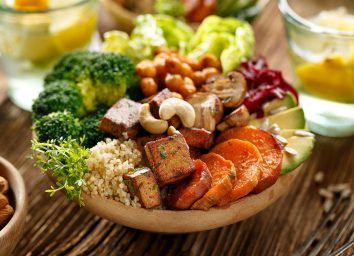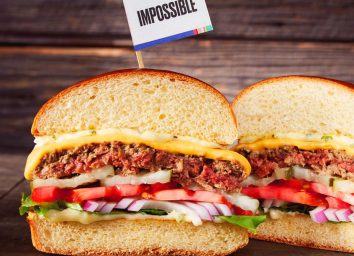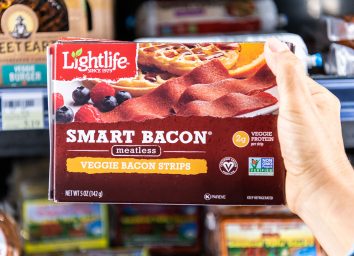The Best and Worst Foods to Eat on a Plant-Based Diet
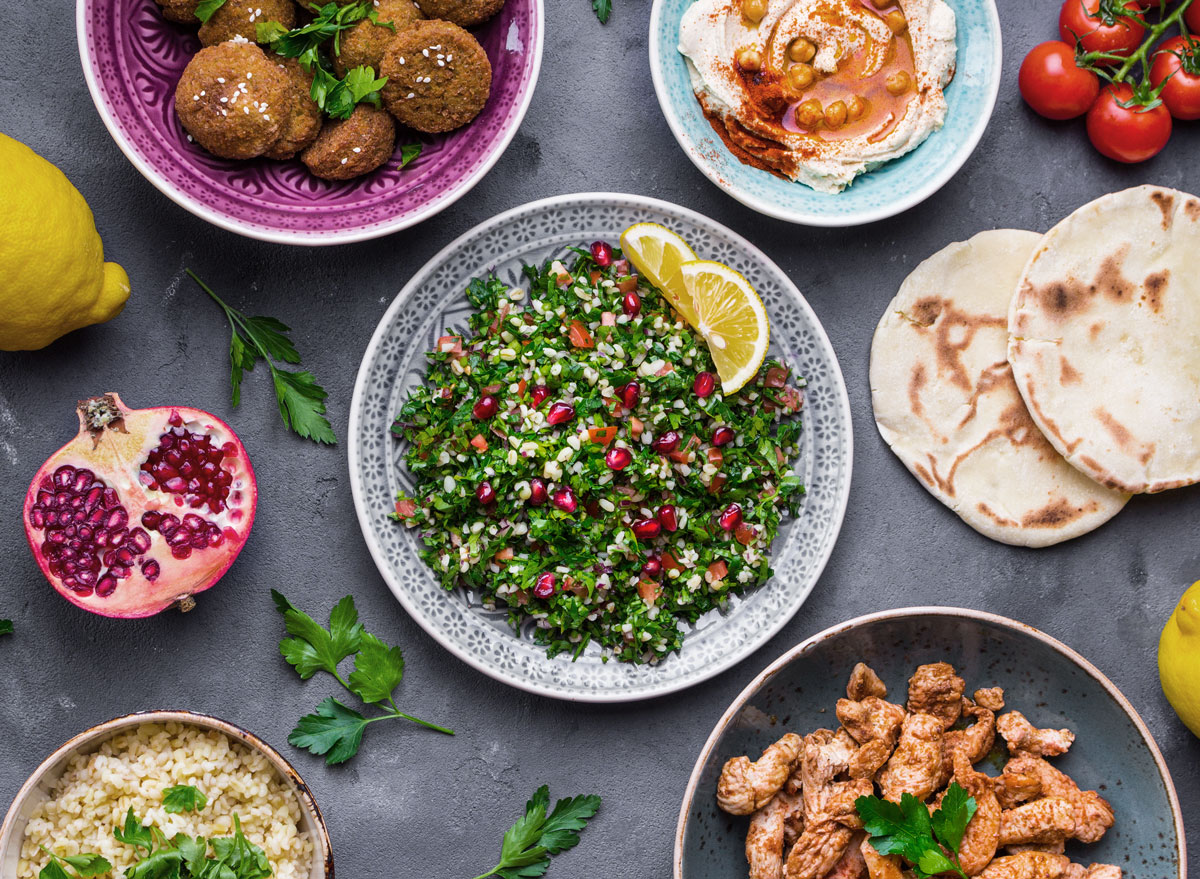
The plant-based diet has probably been popping up in your newsfeed non-stop lately. A diet rich in plant-based foods is what's now being recommended by medical experts and scientists as the prime way to not only better your overall health, but also to save the planet.
And unlike most diets (even compared to the vegan diet), this one doesn't come with a long list of complicated rules. In fact, the premise is pretty simple: Ditch the processed stuff and fill your body with whole, unrefined plant-based foods that fuel you.
But despite being relatively straight-forward, there are still some dos and don'ts you need to follow when it comes to the best and worst plant-based foods that deserve a place on your grocery list. Before we dive into the plant-based food list you should have tacked onto your refrigerator, let's review what exactly this diet entails.
What is a plant-based diet?
When you're on a plant-based diet, you're eating mainly natural, plant-based foods—aka all the fruit, veggies, and other wholesome goodies you want!—with very minimal or no animal products. You should also stop eating processed food, which tends to be loaded with ingredients that aren't doing your health any favors.
Because the bulk of the diet is so healthy, you don't feel like you're missing out on anything—especially because you can eat as much of those plant foods as you want to ensure you're full and satisfied. Yeah, name another diet that lets you do that.
"Following a plant-based diet doesn't mean you're giving up anything. It means you're embracing an eating style that focuses on eating more plants. This is beneficial both for your health and for the environment," says Amy Gorin, MS, RDN, owner of Amy Gorin Nutrition in the New York City area.
What foods are allowed on a plant-based diet?
Most foods can fit into a plant-based diet. What's more important than the specific plant foods you're eating is that you're eating plant foods at every meal. "When following a plant-based diet, aim to incorporate more plants into all your eating occasions," says Gorin. "I advise my clients to incorporate a fruit or vegetable into every meal or snack. Then, aim to have some of your protein and healthy fat sources be plant-based—for instance, chickpeas or lentils in a power bowl, and pistachios or a sliver of avocado at snack time," Gorin says.
By going plant-based, you'll feel better, have more energy, help your body fight off disease, lose weight, among other plant-based benefits.
To get started, here's exactly what you can eat, as well as the things you might want to avoid on a plant-based diet.
The best plant-based foods you should be eating.
Experts recommend adding these nutrient-dense, plant-based foods to your grocery list to improve overall health and create tasty meals.
Vegetables
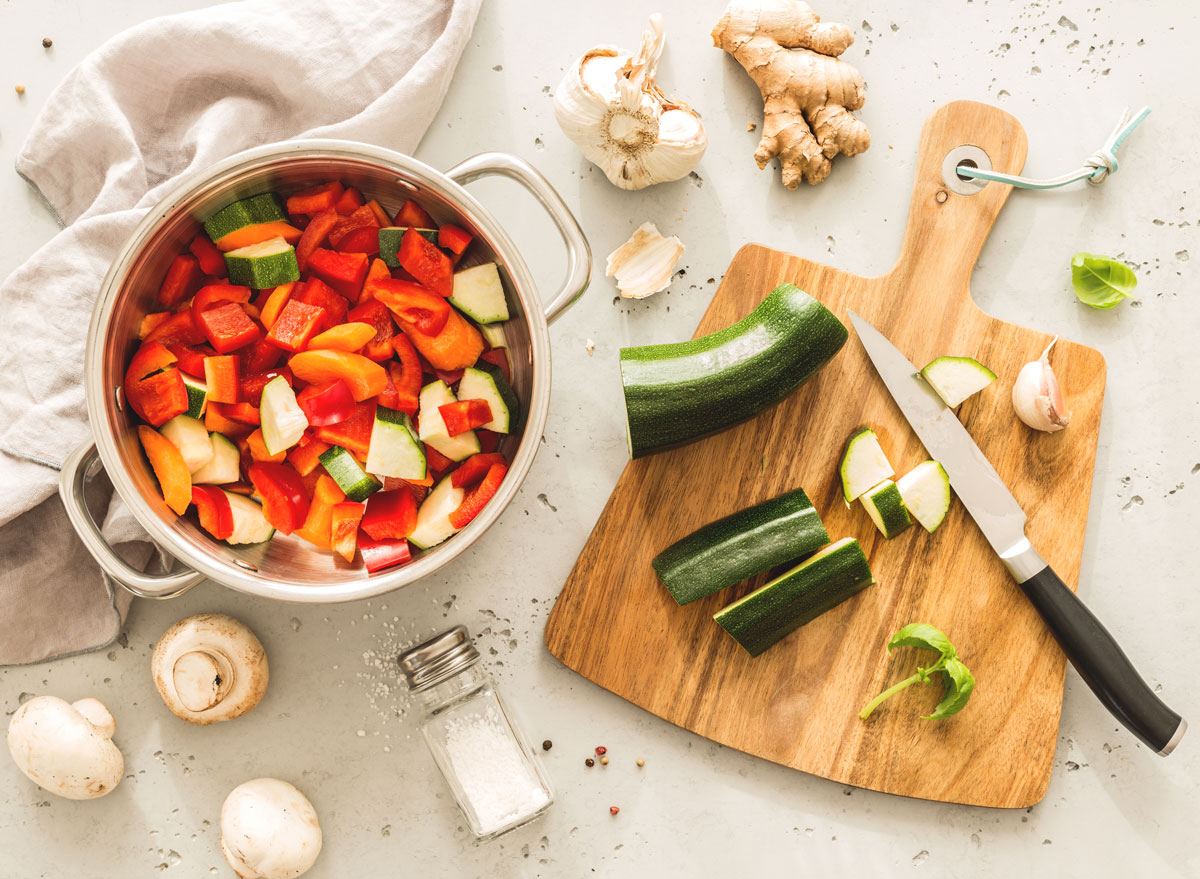
You know vegetables are healthy. It's what your parents have been grilling in your mind since day one. Considering veggies make up the majority of a plant-based diet, it's no surprise that upping your intake brings on plenty of benefits. And the best part? All of them are fair game, and none of them are off-limits.
"Veggies offer antioxidants, vitamins, and minerals—all of which can help with everything from preventing chronic disease to helping your immune health," Gorin says. "Non-starchy vegetables are low in calories but boast both water and fiber—both of which help keep you fuller for longer. There are so many ways to use them, too. You can add grilled veggies to a vegan power bowl, make a white bean pizza with tomatoes, and more."
- Cauliflower
- Spinach
- Carrots
- Broccoli
- Brussels sprouts
- Kale
- Beets
- Asparagus
- Mushrooms
Fruits
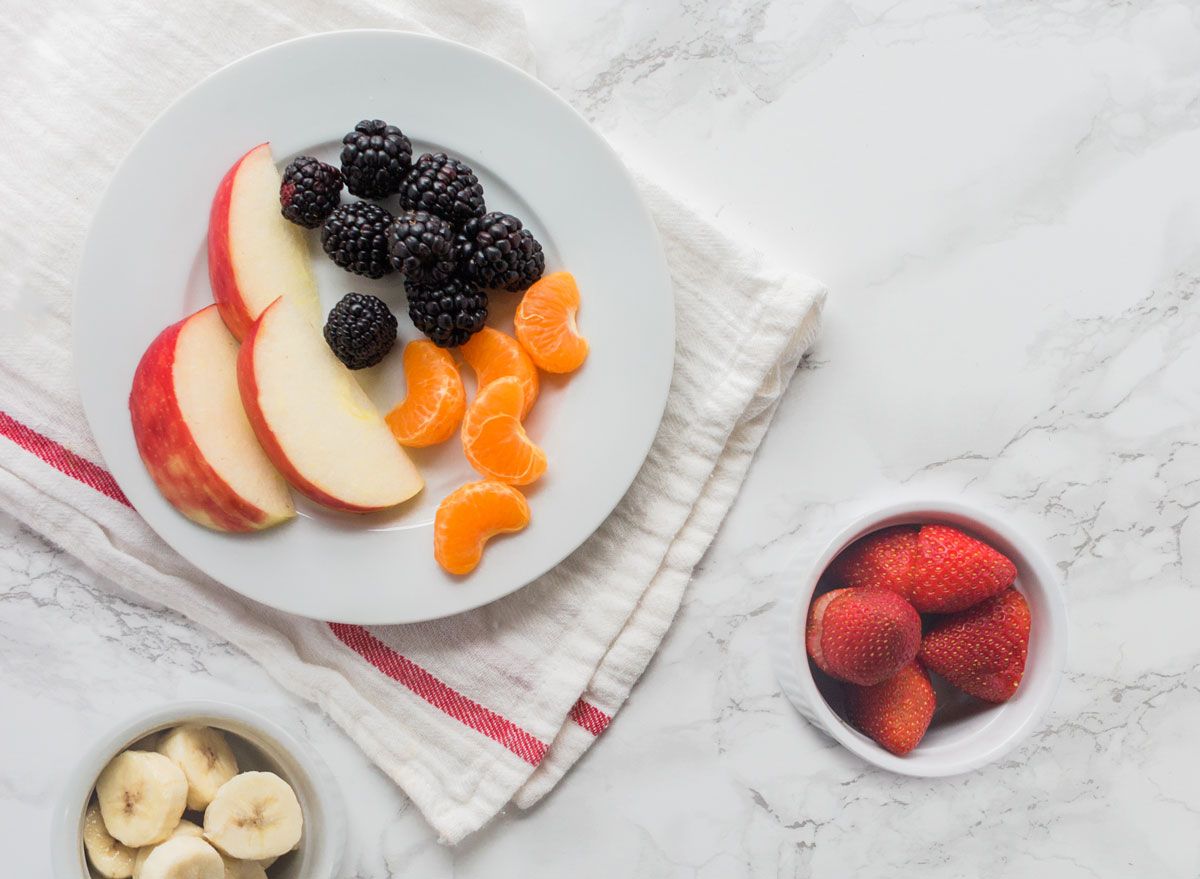
Some diets forbid fruit. But why should you ever give up nature's candy? On a plant-based diet, you can eat all kinds and as much as you want. When you're taking in all the body-boosting nutrients of the naturally-sweet foods—be it bananas, melons, and more—you could see numerous improvements in your health. For example, research shows berries provide disease-fighting antioxidants, and grapes can help lower blood pressure and reduce inflammation. Whatever your fruit of choice is, you can't go wrong.
- Apples
- Bananas
- Pears
- Blueberries
- Cherries
- Grapefruit
- Oranges
- Plums
- Strawberries
- Grapes
- Pineapple
Tubers
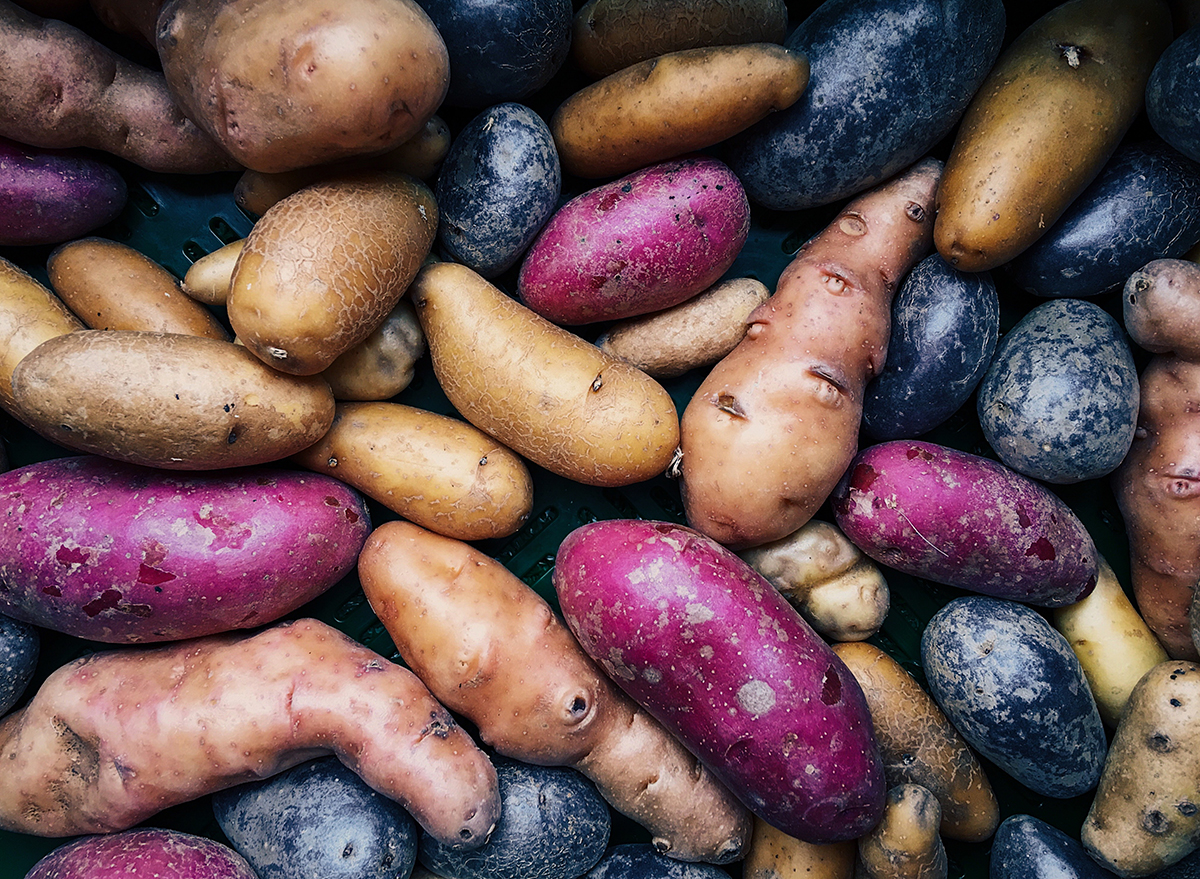
There's no reason to steer clear of tubers. The starchy plants are loaded with healthy carbohydrates that your body uses for energy, not to mention vitamins and nutrients that can keep you healthy, says Harvard University. Sweet potatoes, for instance, contain high amounts of beta-carotene—a phytochemical that can help boost your health and fight off disease. Plus, all tubers are super filling and comforting. You can bake them, mash them, chop them up into French fries—the list goes on. And while sweet potatoes are known as the "healthy" of the tubers, the difference between brown and sweet potatoes isn't as drastic as you may think. Regular brown potatoes are superfoods in their own right.
- Potatoes
- Yams
- Sweet potatoes
Whole grains
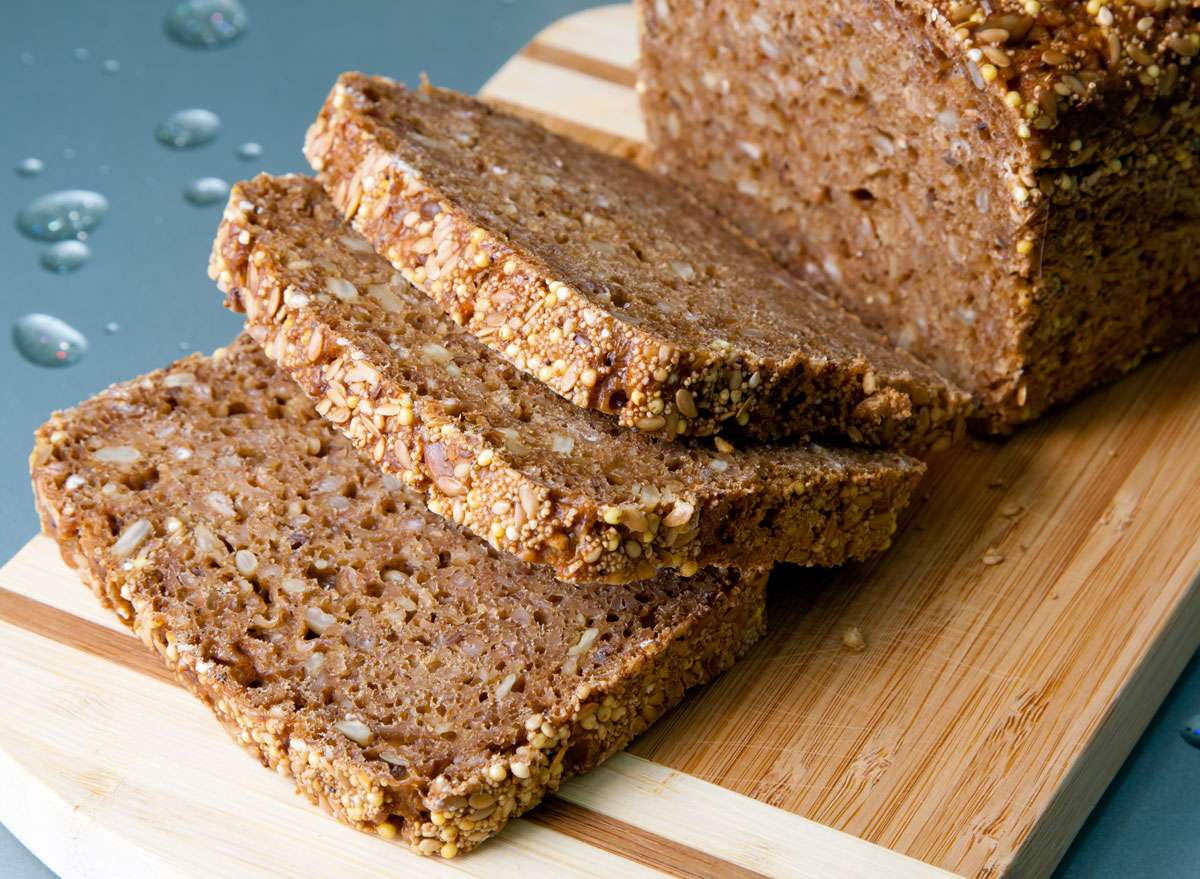
Go carbs crazy. Just stick to whole grains. According to the University of Minnesota, the healthy plant-based staple has numerous health benefits, including improving your digestive system, regulating your blood sugar, and reducing cholesterol. In addition, you can count on them to help you stay satisfied between meals, as the fiber-rich foods make you feel full.
- Oats
- Brown rice
- Millet
- Bulgur wheat
- Corn
- Farro
Plant-based oils and fats
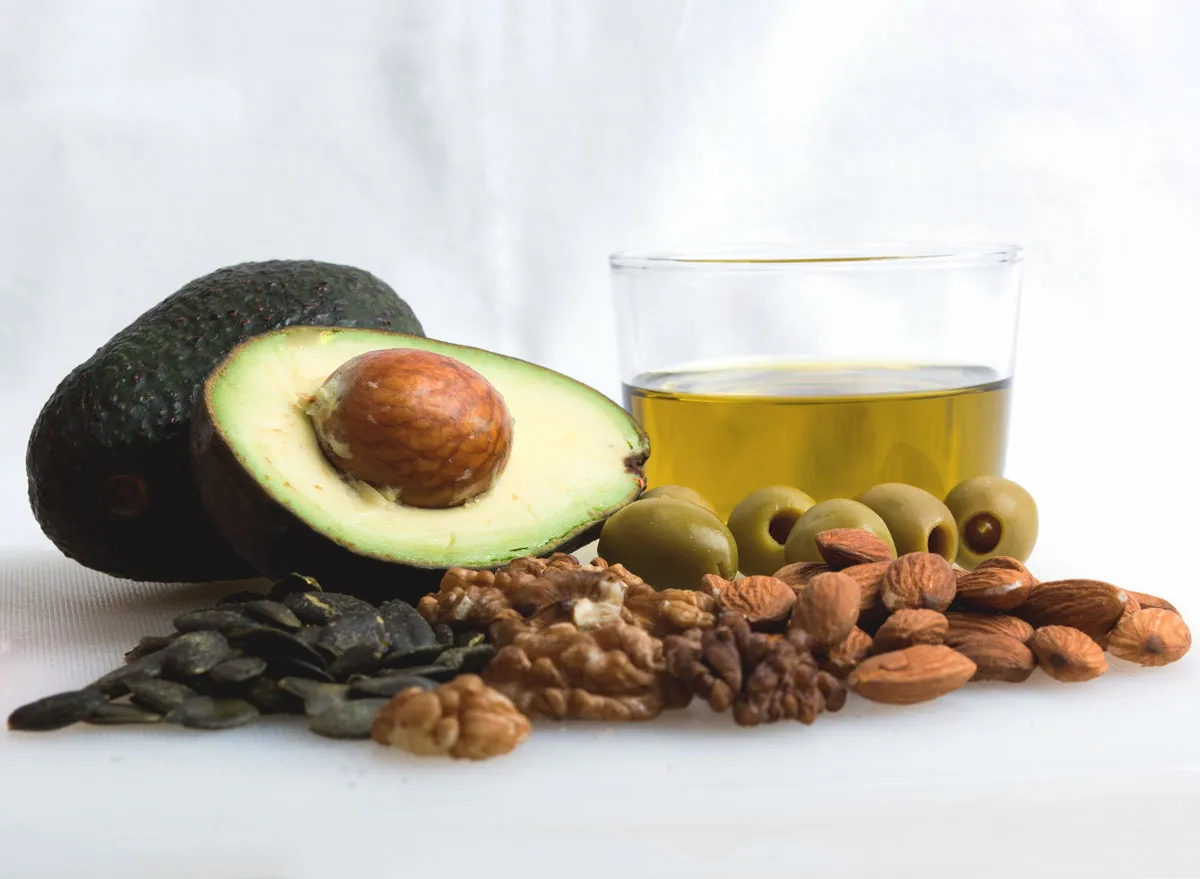
It's not just plants you can eat on a plant-based diet—it's also plant-based oils and fats. "Plant-based fats tend to boast healthier mono- and/or polyunsaturated fats, which are heart-healthy. These healthy fats also tend to be lower in saturated fats," Gorin says. "Avocado, for example, boasts heart-healthy fats and also offers potassium, a mineral that can counteract sodium to help control your blood pressure levels."
- Olive oil
- Sesame oil
- Avocado
- Flaxseed oil
- Walnut oil
Nuts
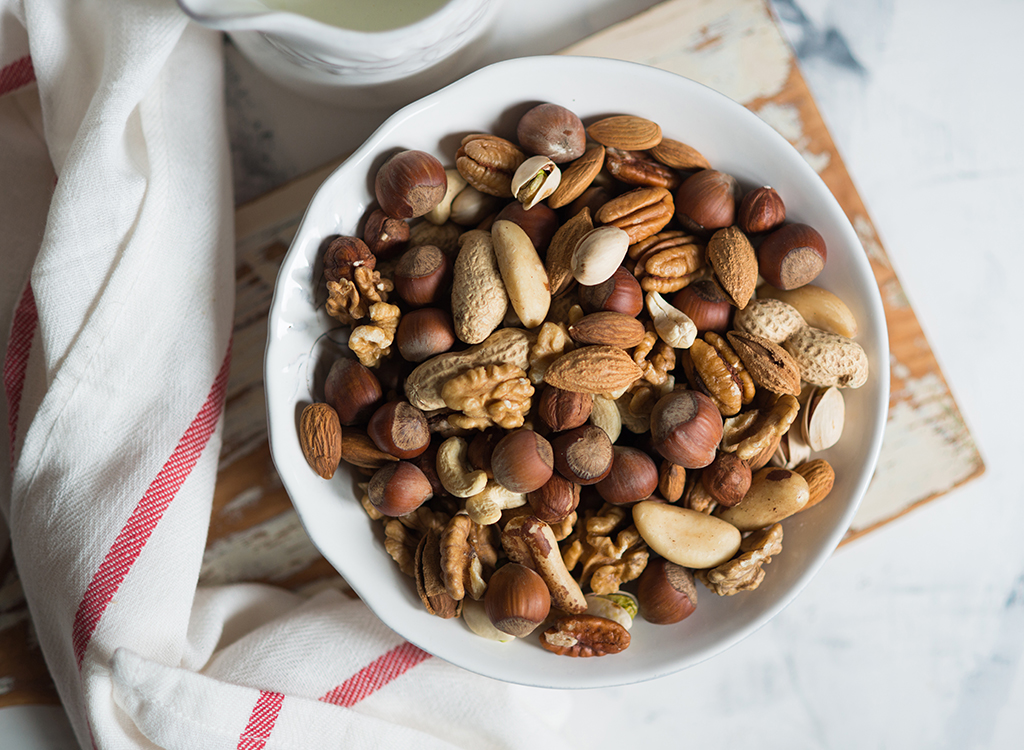
Another healthy plant-based fat source is none other than nuts. Almonds, cashews, walnuts—they're all fair game. "When it comes to healthy fats, don't forget nuts! Close to 90 percent of the fat found in pistachios, for instance, are the better-for-you mono- and polyunsaturated types. They're one of the highest snack nuts in protein and fiber," Gorin says. "Together, the plant protein, healthy fat, and fiber help keep you satiated for longer."
- Almonds
- Walnuts
- Pistachios
- Pecans
- Cashews
Seeds
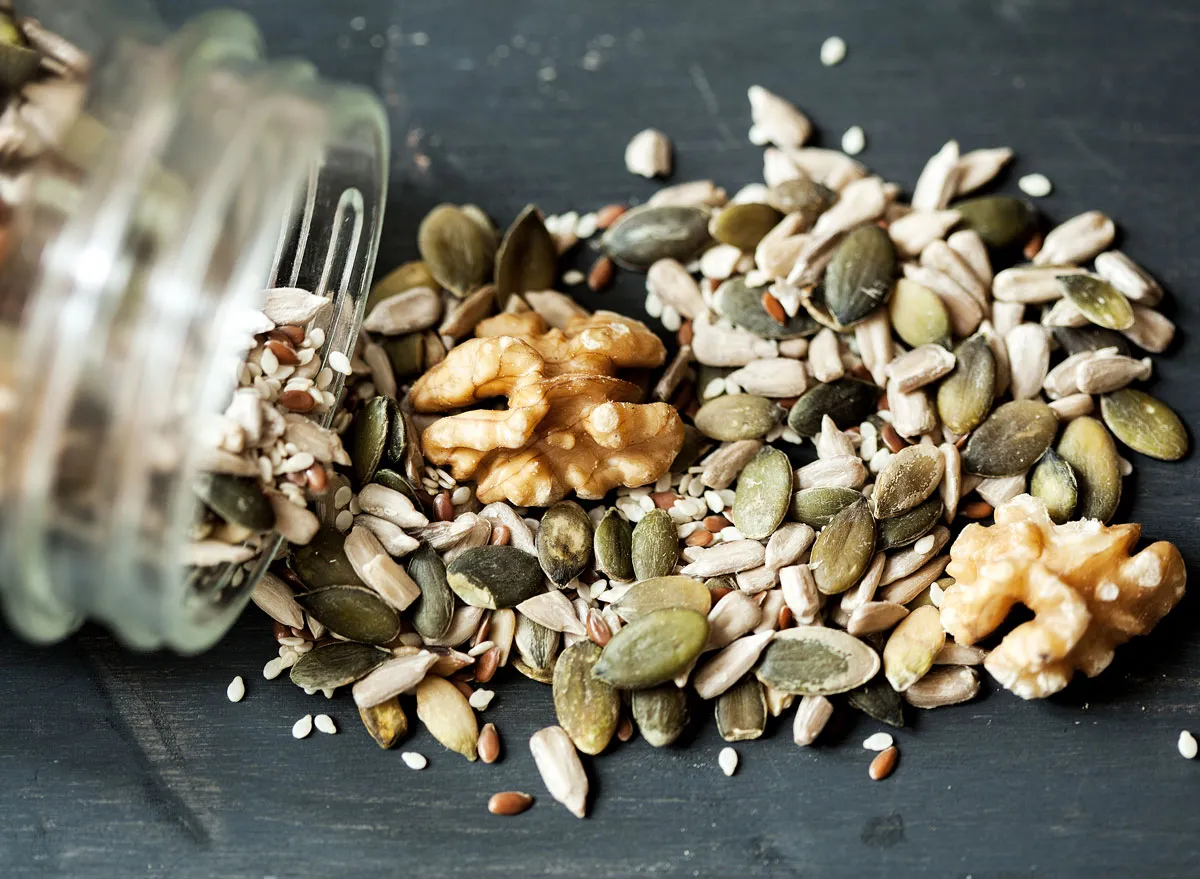
Like nuts, seeds are a simple way to add healthy fats, protein, and plenty of fiber to your diet. According to Duke Health, they can help fight off heart disease, keep your weight down, and prevent the accumulation of LDL cholesterol. And even though they're tiny, they're mighty: They contain high levels of omega-3 fatty acids, vitamins, and minerals that can help better your health and well-being.
- Quinoa
- Chia seeds
- Pumpkin seeds
- Sunflower seeds
- Hemp seeds
- Sesame seeds
- Flax seeds
- Poppy seeds
Legumes
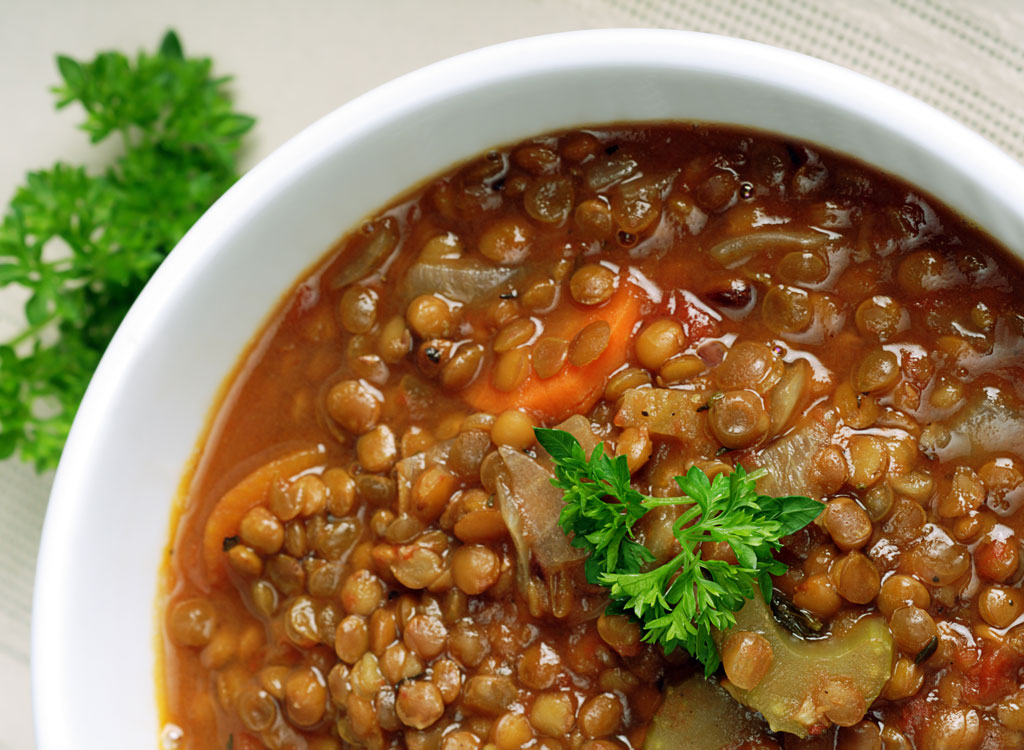
Where do plant-based eaters get most of their protein from, you ask? Legumes, which include beans, peas, and lentils. According to the Mayo Clinic, they're low in fat, contain zero cholesterol (like animal-based protein!), and are loaded with fiber and protein. Past studies have shown eating them regularly can help lower your risk of developing diabetes, obesity, heart disease, and strokes.
These plant-based foods are versatile, too. You can make veggie burgers out of them, toss them into soups and stews, purée them into dips, use them as a topping—the list goes on. Just pick a type and you'll quickly uncover an endless amount of delicious ways to prepare them.
- Chickpeas
- Lentils
- Peanuts
- Beans
- Alfalfa
- Clover
- Lentils
Beans
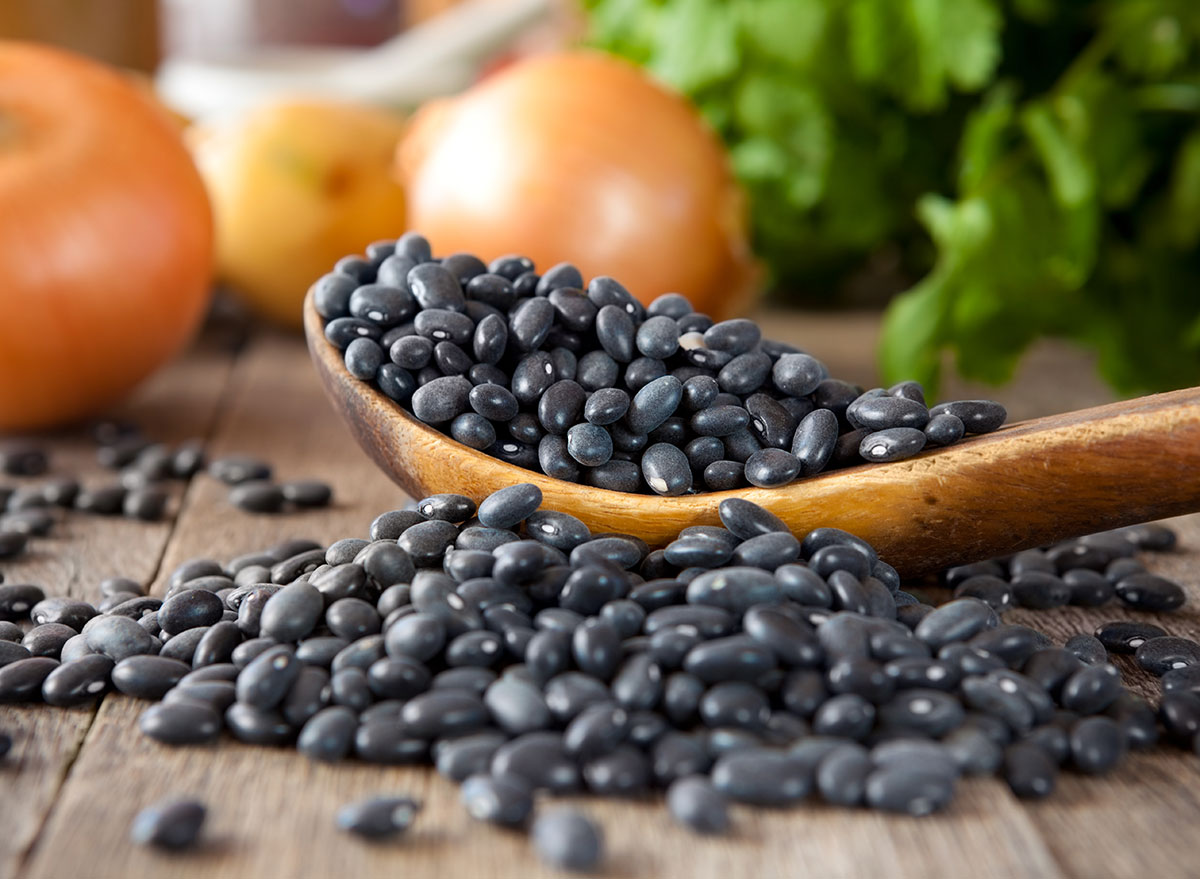
Okay, okay—beans are technically a legume. But since there are so many of them, they're worthy of their own section among our best plant-based foods. They contain an impressive amount of fiber, protein, and vitamins and minerals, including zinc, iron, and magnesium. They're also great at keeping your heart and digestive system healthy and are loaded with antioxidants that can help fight off disease. In fact, a 2001 study published in JAMA Internal Medicine found eating beans four or more times per week was associated with a 22 percent lower risk of cardiovascular disease.
- Black beans
- Edamame
- Fava beans
- Kidney beans
- Navy beans
- Pinto beans
- Soybeans
Spices
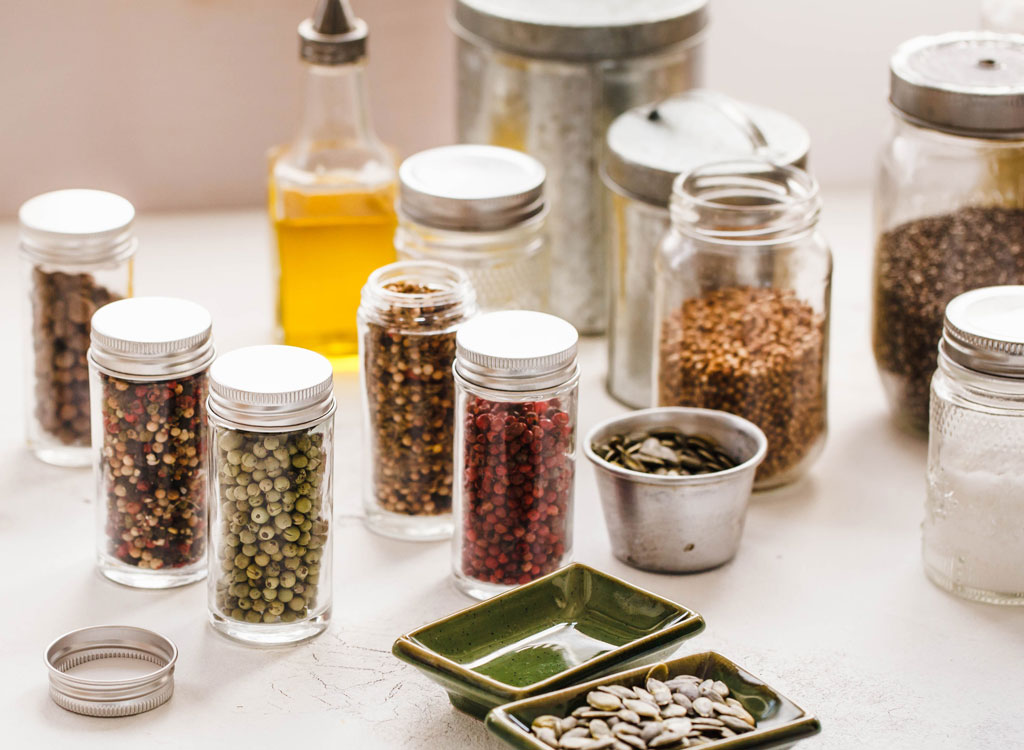
Eating plain broccoli might be a little boring, but that's what spices are for. When you're eating plant-based, having a pantry filled with options can completely transform your meals. "In my opinion, a meal isn't typically complete until you've added a little spice. Spices and herbs not only help to jazz up your meal for extremely few calories and no added sugar—they also supply incredible health benefits," Gorin says.
"Ginger, for example, can help alleviate nausea and contains the substances gingerol and shogaol, which research shows may help control inflammation in your body—something that can contribute to chronic diseases. And turmeric is another spice that's helpful for health because it offers the polyphenol curcumin. It can even help control knee pain as well as ibuprofen."
- Ginger
- Cumin
- Turmeric
- Paprika
- Cinnamon
- Cloves
- Nutmeg
- Vanilla
- Cumin
Herbs
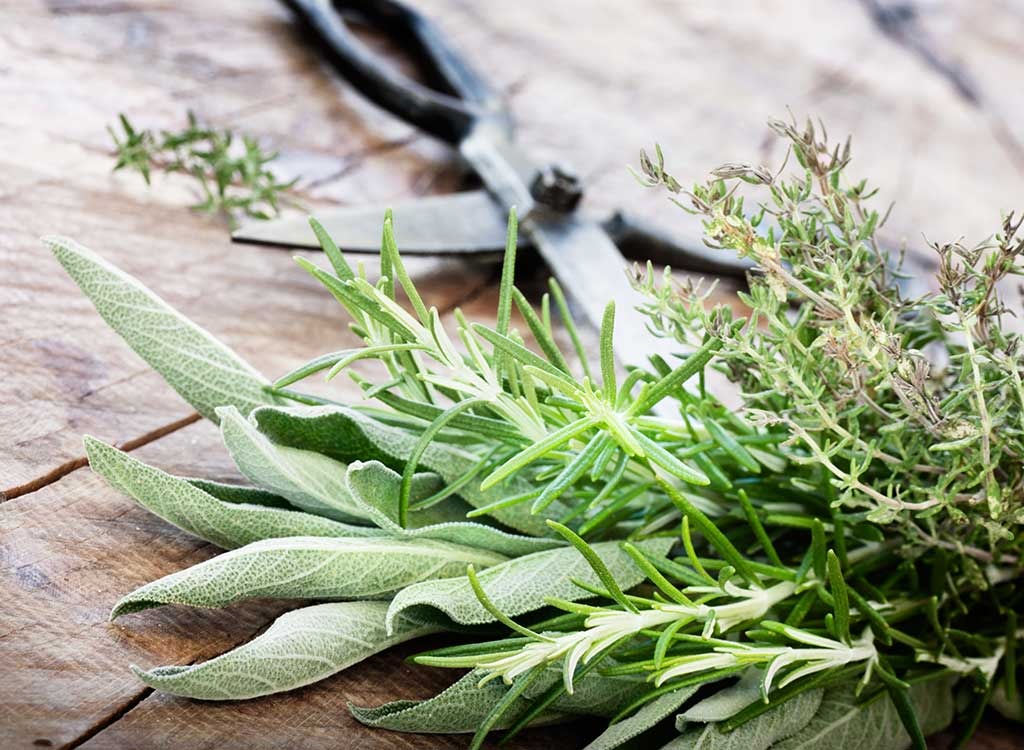
Like spices, using different herbs can also give your meals an upgrade in record time. They're not short on benefits, either. Aside from adding great flavor, research shows that oregano, for example, has anti-cancer properties, and basil has been found to help strengthen the immune system, alleviate anxiety, and enhance memory.
- Parsley
- Basil
- Oregano
- Thyme
- Sage
- Chives
- Rosemary
- Mint
The plant-based foods you should avoid.
These foods may be plant-based, but they aren't doing your health any favors. Leave these out of your fridge and pantry.
Foods with added sugars
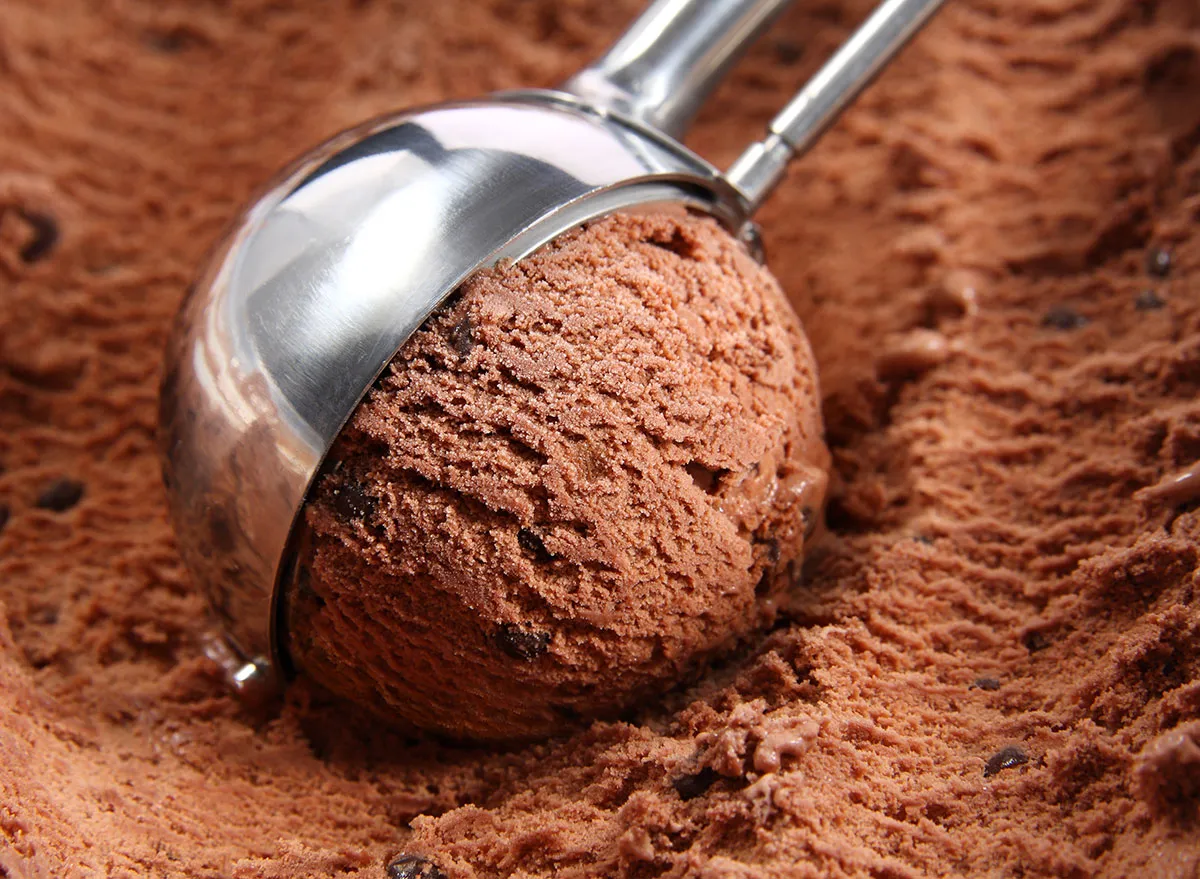
The amount of added sugar companies sneak into products is astonishing, and it's not doing your health any good. In a 15-year-long study published by JAMA Internal Medicine, researchers found most U.S. adults consume 10 percent or more of their daily calories from added sugar. And those in the 25 percent or more range were more likely to die from heart disease. To put your health first, added sugar should be avoided as much as possible. Get it from natural sources like fruit instead.
- Table sugar
- Sodas
- Juices
- Yogurts
- Ice cream
Artificial Sweeteners
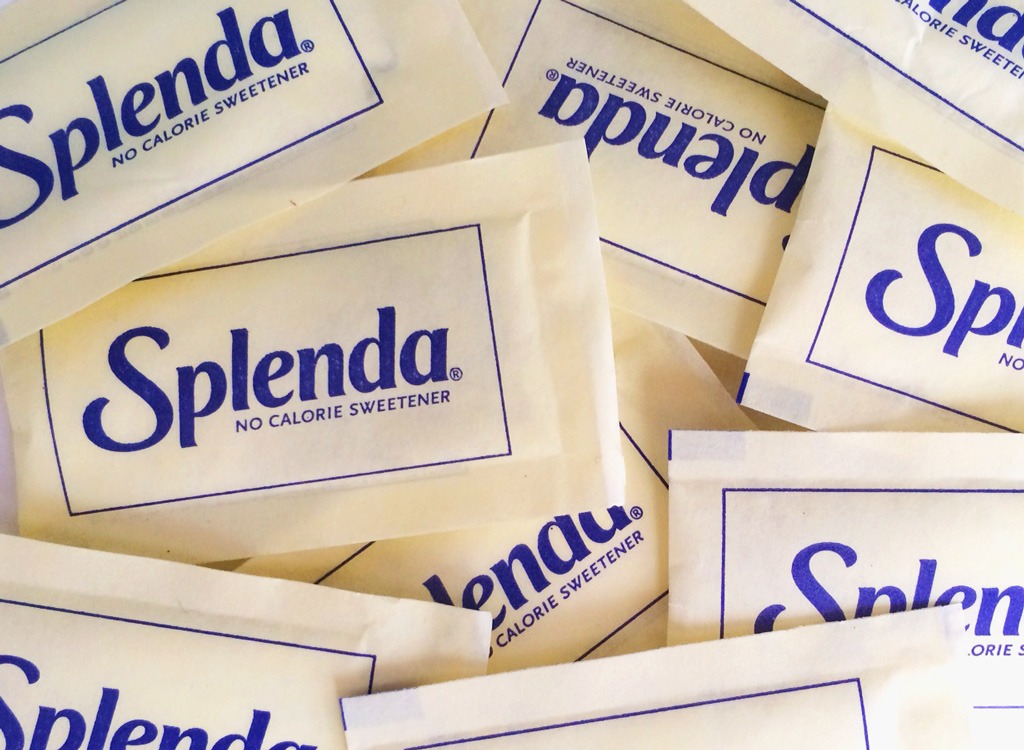
Table sugar isn't allowed on a plant-based diet, and neither are artificial sweeteners. Instead, get your sugar from whole food sources like bananas, dates, or applesauce.
"Like with any type of diet, to obtain the maximum health benefits, it's a very good idea to avoid all types of sugars, refined carbohydrates, syrups, and molasses. It's also a prudent idea to avoid artificial sweeteners—such as Splenda and saccharin—or even natural ones such as Stevia," Mladen Golubic, MD, PhD, told the Cleveland Clinic. "Constant exposure to such substances causes our taste buds in the feeding centers of the brain to crave constant sweetness. Because of that, we're more likely to eat foods that contain simple carbohydrates or even to eat more food."
- Splenda
- Equal
- Sweet'N Low
Refined grains
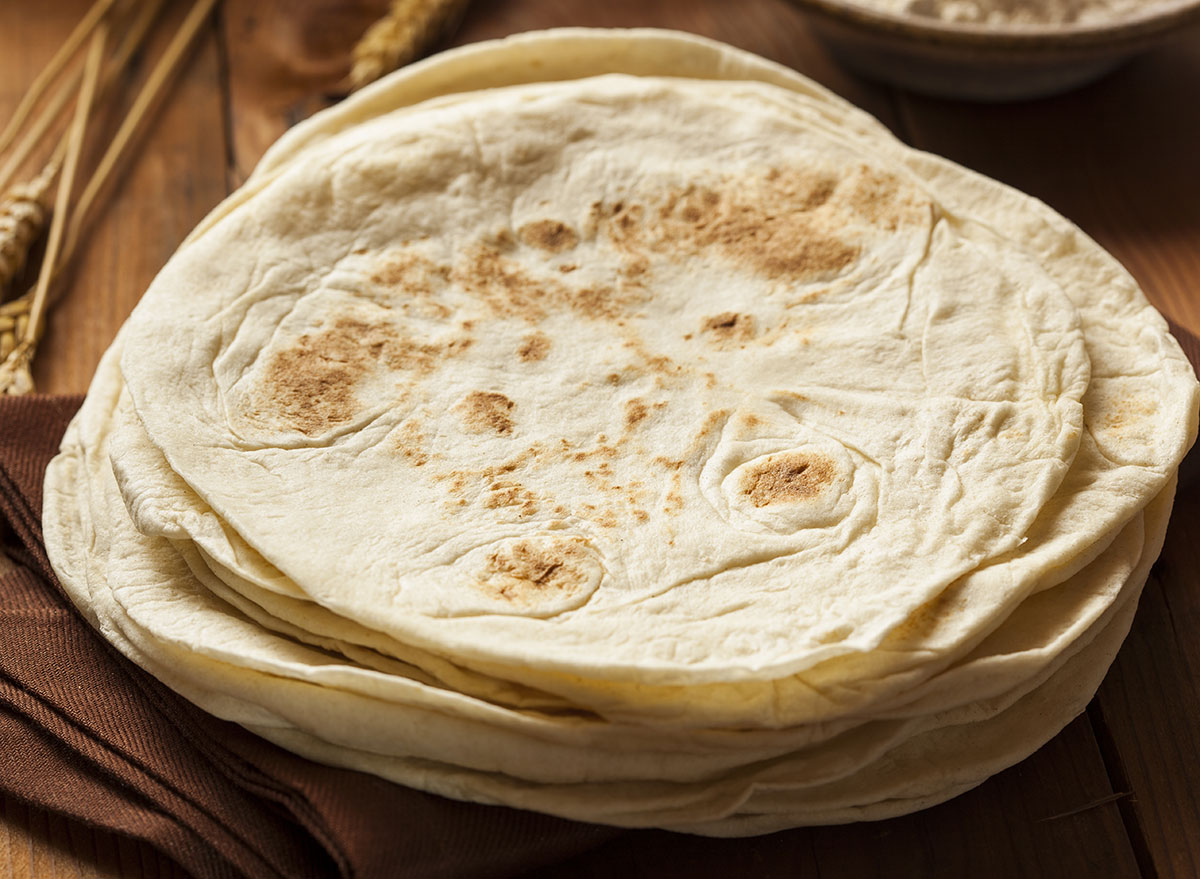
While refined grains like white pasta and bread certainly qualify as plant-based foods, experts don't recommend them on the diet. Because they're stripped of the bran and germ in production, most of the nutrients and fiber are lost, says the Mayo Clinic. Because of that, they'll not only leave you hungry, but they'll also spike your blood sugar. Whole grains, on the other hand, have all of their nutrients and fiber intact, giving you a healthy, hearty, and satisfying carb to enjoy with your meals.
- White bread
- White pasta
- White tortillas
- White flour
- White rice
Packaged convenience foods
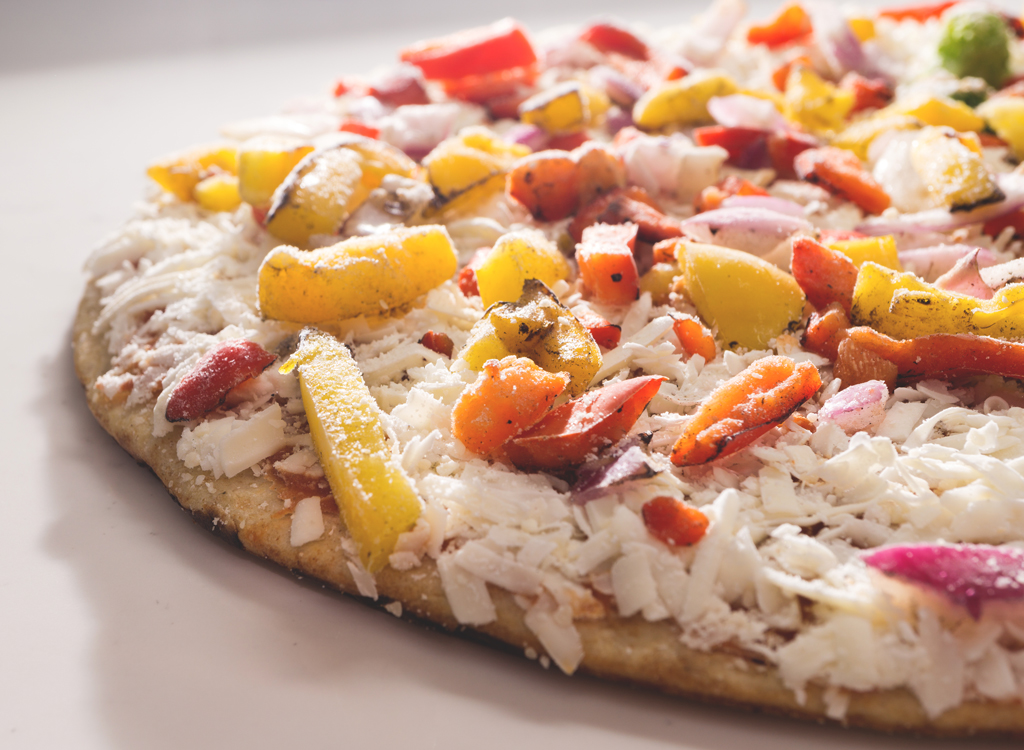
A plant-based diet definitely doesn't include packed foods. Unlike the vibrant whole foods that should make up the bulk of your diet, these are processed and loaded with artificial colors and flavors, high amounts of sugar and sodium, and chemical additives, says Harvard University. Eating these processed packaged convenience foods regularly could even increase your risk of heart disease, diabetes, and obesity.
- Chips
- Cookies
- Frozen dinners
- Pizza
- Cereal
Processed meat
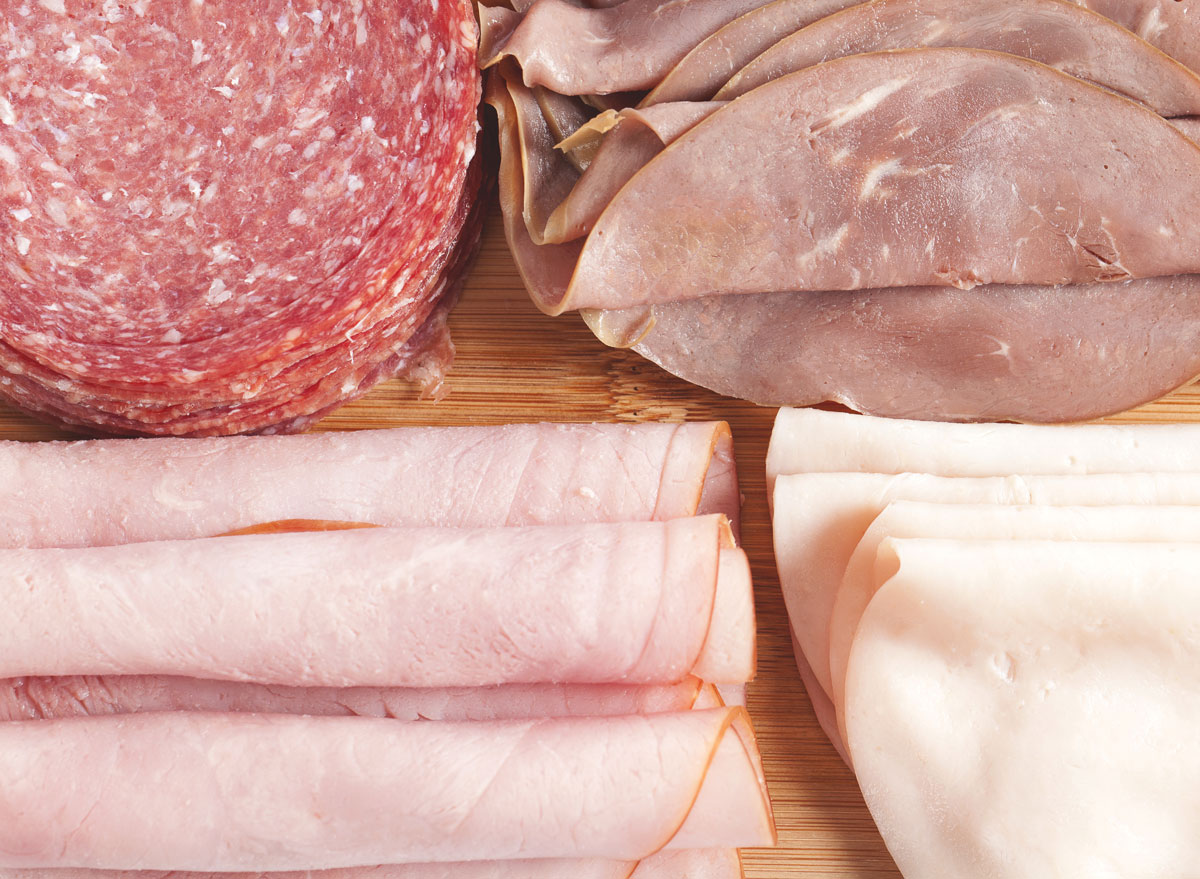
You've probably heard the not-so-flattering rumors about processed meat, and they're definitely true. "Cutting back on processed red meat—such as hot dogs and sausage—is only going to benefit your health," Gorin says. "Eating processed red meat is connected with a higher risk of colorectal cancer. Interestingly, eating plants can help negate health effects of red meat. The resistant starches in pulses may help reduce the risk of colon cancer that comes from a diet high in red meat." Aka plants > meat all day, every day.
- Salami
- Sausage
- Bacon
- Beef jerky
Processed plant-based foods
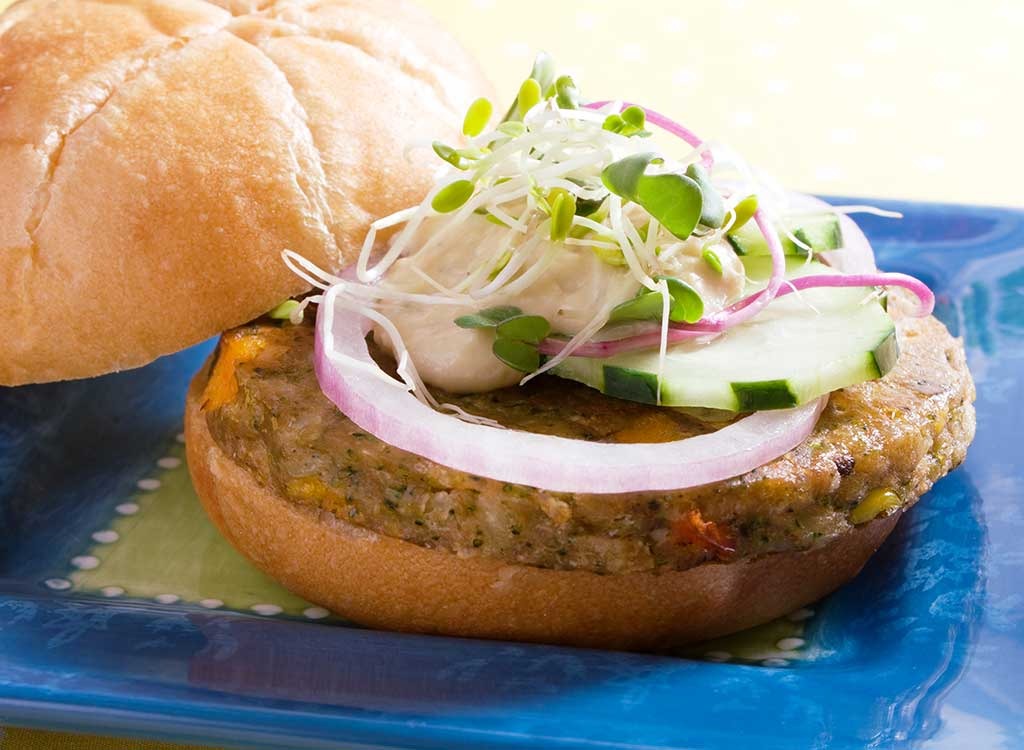
Animal products should be kept to a minimum on a plant-based diet, but plant-based or vegan versions are okay, right? Not so fast. Processed packaged foods are no-gos, period. Even though options free of animal products are often healthier and made with better-for-you ingredients, they're not wholesome enough for a plant-based diet. That's why it's always a better idea to make your own homemade black bean burger, for instance, opposed to buying one at the store.
- Soy-based frozen veggie burgers
- Faux meats
- Vegan eggs
- Vegan cheese
- Vegan frozen dinners
Processed cheese
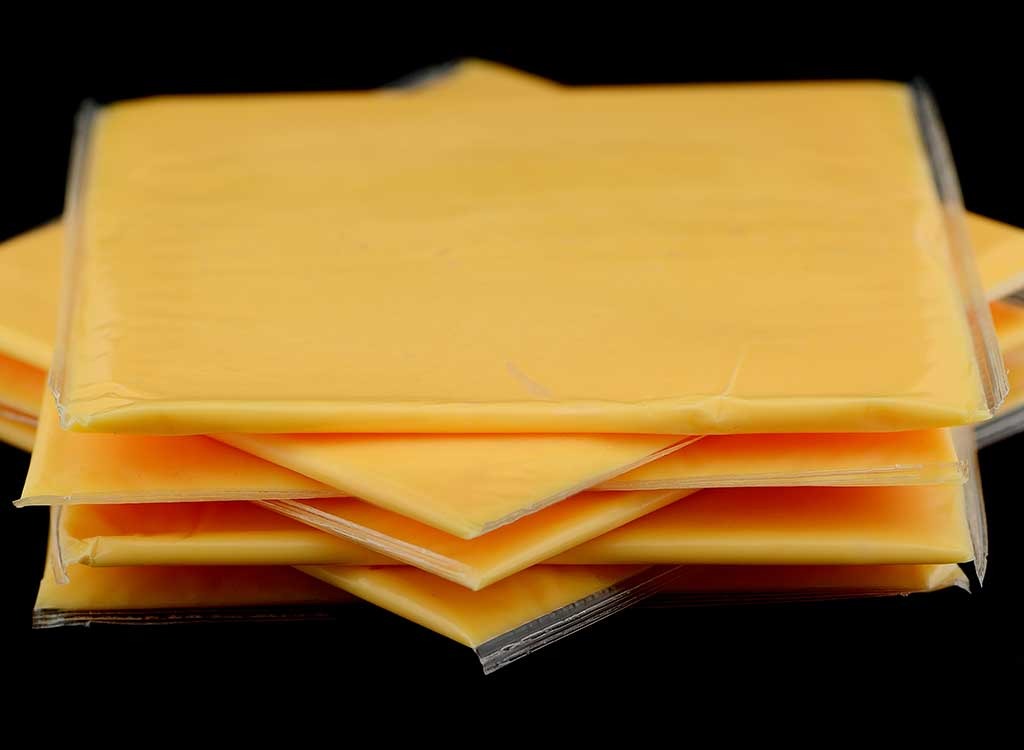
Sorry, but you're going to need to say goodbye to processed dairy cheese. According to the Cleveland Clinic, it's loaded with saturated fat, and eating it regularly can increase the amount of cholesterol in your blood, putting you at risk of heart disease. While vegan cheeses don't contain cholesterol, as they're not made with animal products, they're still not allowed on a plant-based diet too due to being processed.
- Dairy cheese
- Vegan cheese
